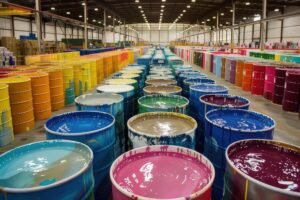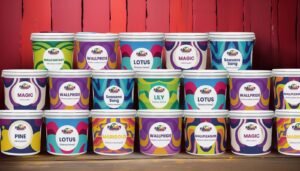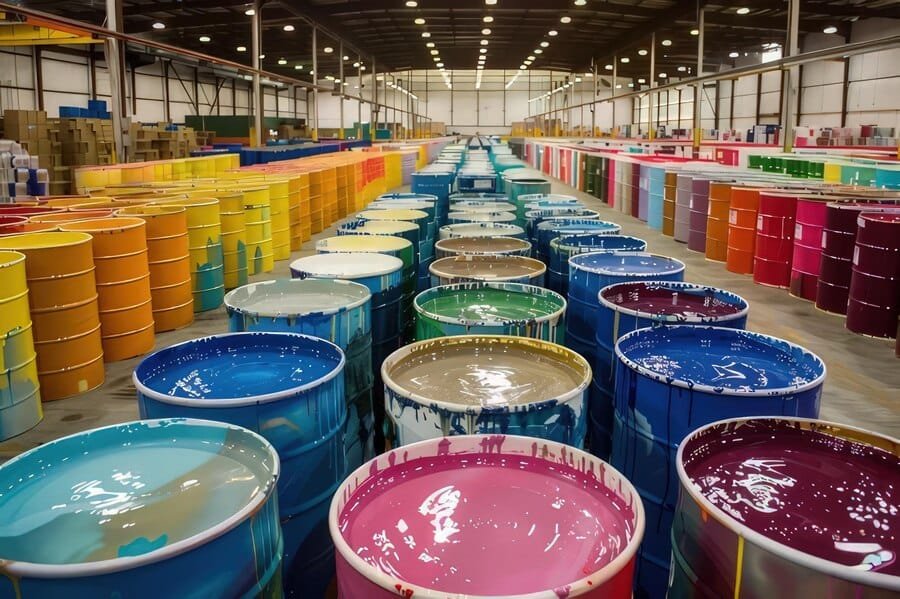Introduction to Industrial Paint Production in Pune
Industrial paint production is a specialized segment of the coatings industry focused on creating high-performance paints and coatings designed to meet the rigorous demands of various sectors, including automotive, construction, and manufacturing. Unlike decorative paints, which primarily serve aesthetic purposes, industrial paints possess unique characteristics that prioritize durability, resistance to environmental factors, and adherence to regulatory standards. This distinction is critical as industrial environments often expose coatings to harsh conditions, such as chemicals, temperature fluctuations, and mechanical abrasion.
The production processes employed in industrial paint manufacturing are complex and require precision. Raw materials such as resins, pigments, solvents, and additives are carefully selected to formulate products that can withstand extensive use. Chemical reactions are precisely controlled to create formulations that exhibit specific properties, such as enhanced adhesion, corrosion resistance, and UV stability. The focus on quality control is paramount, as the performance of these coatings can impact the longevity and safety of the products they protect. Thus, industrial paint must meet strict specifications to ensure reliability.
Pune plays a significant role in the industrial paint production landscape, serving as a hub for many manufacturers specializing in this sector. The city benefits from its strategic location, skilled workforce, and growing infrastructure, making it an ideal center for paint production. Additionally, the demand for industrial paint in industries such as automotive and construction continues to rise, driven by the need for robust and sustainable solutions. This evolving landscape presents opportunities for growth and innovation in paint technologies, further establishing Pune as a key player in the industrial paint market.

Pune: A Hub for Industrial Paint Manufacturing
Pune has emerged as a prominent location for industrial paint manufacturing, thanks to a combination of geographical advantages, access to raw materials, and a skilled labor force. Situated in western India, Pune benefits from its strategic location that offers easy connectivity to major markets, both domestically and internationally. This accessibility has led to the establishment of numerous industrial units and has fostered a competitive environment for paint manufacturers.
The proximity to raw material suppliers plays a crucial role in Pune’s industrial paint landscape. The region is dotted with several suppliers of chemicals, pigments, and other essential materials required for paint production. This not only lowers transportation costs but also reduces lead times, allowing manufacturers to respond quickly to market demands. Consequently, this streamlining of supply chains enhances the overall efficiency of the production processes, thus contributing to Pune’s reputation as a manufacturing hub.
Moreover, the presence of a skilled labor pool cannot be overlooked. Pune is home to numerous educational and vocational institutions, which provide specialized training in chemical engineering and manufacturing processes. This influx of skilled workers has enabled local industries to maintain high standards of quality and innovation in their products. The combination of theoretical knowledge and practical skills ensures that the workforce is well-equipped to meet the challenges of the evolving industrial paint market.
Additionally, evolving infrastructure and favorable economic policies have played a significant part in promoting the manufacturing sector in Pune. The local government’s initiatives to enhance industrial infrastructure, such as improving transportation networks and establishing industrial parks, have made the city an attractive destination for investment. Furthermore, policies aimed at supporting small and medium enterprises (SMEs) in the paint industry have fostered a vibrant ecosystem that encourages growth and innovation.
In conclusion, Pune’s strategic advantages, including geographical location, proximity to suppliers, a skilled workforce, and supportive infrastructure, have collectively established the city as a hub for industrial paint manufacturing, bolstering its significance in the broader landscape of the industry.

The Types of Industrial Paints Produced in Pune
Pune has developed as an important hub for industrial paint production in India, contributing a diverse array of paint formulations to meet various industrial needs. Among the different types of industrial paints produced in this region, solvent-based paints are quite prevalent. These paints rely on organic solvents to dissolve the resin, which facilitates the application and drying processes. Solvent-based paints are widely used in industries such as automotive and manufacturing, where durability and resistance to harsh environmental conditions are paramount.
Another significant category is water-based paints, which have gained popularity due to their low environmental impact and reduced emissions of volatile organic compounds (VOCs). Water-based industrial paints are increasingly favored in sectors like construction and woodworking, as they provide an effective solution for achieving high-quality finishes while adhering to stringent environmental regulations. These paints are renowned for their ease of cleaning and reduced flammability, thus enhancing safety standards in application.
Additionally, Pune produces powder coatings, which are a unique form of paint applied as a dry powder. This method involves a process of electrostatic spray deposition, ensuring an even distribution and superior finish on metal surfaces. Powder coatings are commonly utilized in automotive applications, appliances, and metal furniture, known for their resilience and ability to withstand high temperatures and corrosion.
Specialty coatings also play a vital role in the industrial paint landscape of Pune. These include anti-corrosive coatings, fire-retardant coatings, and anti-graffiti coatings, which are designed for specific applications across varied industries, such as aviation, marine, and infrastructure. Each of these specialized formulations is engineered to meet unique performance requirements, ensuring safety and longevity in challenging environments.

Key Players in Pune’s Industrial Paint Sector
Pune, known for its robust industrial landscape, is home to numerous companies engaged in industrial paint production. Among these, prominent players contribute significantly to the sector, pushing the boundaries of innovation and excellence. One of the largest manufacturers is Berger Paints India Ltd., which holds a strong presence in Pune. The company offers a wide range of industrial coatings that cater to diverse applications, emphasizing quality and durability. Their commitment to sustainability is evident through the development of eco-friendly formulations, which resonate with contemporary environmental concerns.
Moreover, smaller firms like Starlite Paints have garnered attention for their specialized products tailored to niche markets. They focus on developing user-centric solutions that emphasize customization and client consultation. This adaptability is crucial as industries evolve and require tailored solutions to meet specific challenges.
In summary, Pune’s industrial paint sector is characterized by a dynamic interplay of large corporations and local manufacturers, each contributing uniquely to the growth and innovation within the industry. Their collective efforts underscore the region’s significance as a hub for industrial paint production.
Environmental Regulations and Compliance
The industrial paint production landscape in Pune is significantly shaped by an array of environmental regulations and compliance measures that manufacturers must adhere to. As global awareness of environmental issues rises, regulatory bodies in India, including the Ministry of Environment and Forests, have instituted strict guidelines aimed at minimizing the ecological footprint of industrial operations. These regulations encompass various aspects of paint production, from raw material sourcing to disposal processes.
One of the pivotal concerns in industrial paint manufacturing is the reduction of volatile organic compounds (VOCs), which pose significant health risks and contribute to air pollution. To address this, regulatory frameworks mandate the monitoring and control of VOC emissions, forcing companies to innovate and adopt eco-friendly practices. These may include the incorporation of water-based formulations or low-VOC alternatives in their paint production processes, thereby promoting sustainability while ensuring compliance with environmental standards.
Moreover, implementing eco-friendly practices is not solely a matter of regulatory compliance; it also represents a shift in business strategies within the industry. Many manufacturers in Pune are investing in research and development to create paints derived from sustainable materials, which not only comply with environmental laws but also cater to the growing demand for green products among consumers. Initiatives like adopting efficient waste management systems and utilizing recycling technologies further underline the commitment of these companies to reducing their environmental impact.
In conclusion, the regulatory framework governing industrial paint production in Pune plays a crucial role in shaping practices that prioritize environmental sustainability. Compliance with these regulations not only fulfills legal obligations but also fosters innovation in the development of eco-friendly paint solutions. As manufacturers align their practices with these standards, they pave the way for a more sustainable future in the industrial painting sector.
Technological Advancements in Industrial Paint Production
The landscape of industrial paint production in Pune has witnessed significant transformation due to various technological advancements. One of the most notable changes is the integration of automation into manufacturing processes. Automated systems have streamlined production lines, enhancing efficiency and consistency in paint formulation. With robots and advanced machinery handling repetitive tasks, human labor can now be redirected toward more strategic roles, leading to increased productivity. This shift not only reduces the possibility of human error but also optimizes resource usage, contributing to a more sustainable production environment.
Moreover, improvements in formulation technology have play a critical role in the evolution of industrial paint. Research and development in the chemical composition of paints allow manufacturers to create products with enhanced durability, lower environmental impact, and better performance characteristics. For instance, the development of water-based paints and use of eco-friendly materials are becoming more prevalent in the industry. These innovations cater to the growing demand for sustainable options, aligning with global regulatory standards and consumer preferences for eco-conscious products.
Additionally, the impact of digitalization on quality control and supply chain management cannot be understated. Implementing smart technologies, such as IoT (Internet of Things) devices, enables real-time monitoring and data collection throughout the production process. This capability enhances quality assurance by allowing manufacturers to identify and address potential issues promptly. Digital tools also facilitate better supply chain management, ensuring timely procurement of raw materials and distribution of finished products. These advancements significantly contribute to optimizing operational efficiency, ultimately benefitting both manufacturers and customers in the industrial paint market.
In summary, the industrial paint production in Pune is rapidly evolving due to cutting-edge technological innovations. Automation, improvements in formulation technology, and digitalization are reshaping the production landscape, leading to greater efficiency, sustainability, and product quality in the industry.
Challenges Facing the Industrial Paint Industry in Pune
The industrial paint industry in Pune is encountering a variety of challenges that hinder its growth and stability. One of the primary obstacles is the fluctuation in raw material prices. The prices of essential components used in the formulation of paints can vary significantly due to global market trends, supply chain disruptions, and geopolitical factors. This volatility not only affects the cost of production but also creates uncertainty in budgeting and profitability for manufacturers. Companies must adopt strategic procurement practices and diversifying their supplier base to mitigate risks associated with price volatility.
Another significant challenge is the intense competition from other regions within India as well as international markets. The East and South Indian regions have established paint production hubs which offer competitive pricing and advanced technologies. As a result, manufacturers in Pune must continuously innovate their product offerings to maintain their market share. Investing in research and development can help companies create unique formulations, such as eco-friendly and high-performance industrial paints, which are increasingly being sought after in today’s environmentally conscious market.
Economic fluctuations also play a crucial role in shaping the performance of the industrial paint sector. Variations in demand, influenced by economic downturns or slowdowns in the construction and manufacturing sectors, can lead to overproduction or inventory accumulation. To counteract these cycles, businesses should consider adopting flexible production techniques and maintaining adaptive supply chains that enable them to respond promptly to changing market conditions.
In conclusion, addressing these challenges requires a multi-faceted approach. By enhancing supply chain resilience, investing in innovation, and being adaptable to economic trends, the industrial paint industry in Pune can navigate these obstacles and continue to thrive in a competitive landscape.

Future Trends and Opportunities
The industrial paint production landscape has evolved significantly, with a pivotal shift towards sustainability, green technologies, and high-performance coatings. As global awareness of environmental issues rises, the demand for eco-friendly solutions in various sectors, including construction, automotive, and marine industries, has intensified. In Pune, this aligns with a broader trend where manufacturers are increasingly adopting sustainable practices to minimize their ecological footprint. The transition to water-based paints and the use of natural resins are emerging as notable alternatives, as they not only reduce volatile organic compound emissions but also enhance the safety of applications.
Furthermore, the adoption of innovative technologies is transforming the manufacturing processes involved in industrial paint production. These advancements include automated mixing systems, better application techniques, and enhanced curing methods that ensure higher efficiency and consistency in product quality. Industry players in Pune can leverage these technologies to cater to the growing demand for bespoke paint solutions. This includes not only standard paint products but also specialized coatings that offer improved resistance to chemicals, weather, and wear, essential properties in demanding applications.
In addition, the increasing emphasis on high-performance coatings presents a viable opportunity for growth within the Pune market. Industries such as aerospace and healthcare require coatings that boast advanced functionalities like antimicrobial properties or extreme durability. As competition intensifies, paint manufacturers are incentivized to invest in research and development to create unique, tailor-made solutions that can penetrate niche markets.
Overall, the future of industrial paint production in Pune holds substantial promise. By focusing on sustainability and technological advancements, manufacturers can position themselves strategically to meet evolving market demands, ensuring longevity and relevance in an increasingly competitive landscape.

Conclusion
Pune has emerged as a pivotal hub for industrial paint production, reflecting a dynamic blend of tradition and innovation. The city is not only known for its rich cultural heritage but is also making strides in various manufacturing sectors, including the paint industry. With a significant concentration of both large and small-scale manufacturers, Pune boasts a diverse portfolio of products catering to various industries, such as automotive, construction, and decorative applications. This growth trajectory is driven by steady demand, technological advancements, and a skilled workforce, all of which contribute to the overall sustainability of the industrial paint sector in the region.
The focus on developing eco-friendly and high-performance industrial paint products has enabled local industries to adapt to global standards while also addressing environmental concerns. This transition is critical as industries worldwide are moving towards sustainable practices, and Pune is positioning itself as a key player in this evolution. Companies are increasingly investing in research and development, leading to innovations that enhance product quality while minimizing environmental impact.
Furthermore, Pune’s strategic location and excellent transport links facilitate easy access to raw materials and markets, enhancing its competitiveness. The collaboration between academic institutions and paint manufacturers fosters a culture of continuous improvement, ensuring that the industry remains agile and responsive to market trends. Additionally, the support from the local government in terms of favorable policies and initiatives encourages investment and growth in this sector.
In conclusion, the industrial paint production landscape in Pune is poised for further growth and innovation. As stakeholders continue to explore the potential of this vibrant sector, it is essential for interested readers to delve deeper into the developments and opportunities that lie ahead in Pune’s thriving industrial paint industry.

